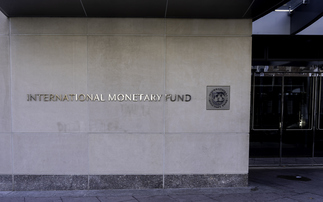Investors managing portfolios worth trillions of dollars are now backing net zero ahead of COP26 - could 2021 prove a transformative year for financial markets?
"There is no company whose business model won't be profoundly affected by the transition to a net zero economy."
For a succinct indication of the direction financial markets are headed in the 2020s and beyond, look no further than the above sentence. Not so much for the words themselves, which few would argue offer a breathtakingly original insight in 2021, but because of the person who wrote them: Larry Fink.
As CEO of the world's biggest asset manager, BlackRock, which looks after a whopping $8.67tr investments worldwide, Fink's words matter a great deal. As ever, the devil will be in the details, but if as Fink promised last month BlackRock - which has long faced pressure to be far bolder in addressing the climate risks in its massive portfolio - uses its considerable clout to push every CEO at every company it works with to set credible, transparent, science-aligned targets to achieve net zero emissions before 2050, then Fink's statement becomes more than just an opinion, but close to a self-fulfilling prophecy.
The reasoning underpinning Fink's letter last month is simple. Climate change and the net zero transition pose huge risks to the financial system unless action is taken, but they also offer massive business opportunities. The transition has barely begun, but already overwhelming evidence shows - particularly after Covid-19 served a body blow to the economy last year - that green companies and technologies are a smarter long term bet for investors. They have continued to confound expectations on costs and deployment rates, while environmental regulations have tightened and consumers have increasingly favoured eco-friendly products and services. As a result green stocks have been quietly outperforming the wider market for years. During 2020, 81 per cent of a globally-representative selection of sustainable indexes outperformed their parent benchmarks, according to Fink.
"The world is moving to net zero, and BlackRock believes that our clients are best served by being at the forefront of that transition," Fink wrote. "While the transition will inevitably be complex and difficult, it is essential to building a more resilient economy that benefits more people."
Fink's letter can be seen, therefore, as a major milestone in the drive for a net zero global financial system, because it demonstrates the agenda is becoming a mainstream consideration across the financial sector. Ultimately, BlackRock is making the tentative first steps towards building a net zero investment portfolio because many others before it have already cleared the pathway, and the business case for a more sustainable approach to investment has become impossible to ignore.
The trailblazers
Following hot on the heels of the introduction of net zero targets from major economies such as the UK and France, the Net Zero Asset Owners Alliance was launched in September 2019, comprising more than 30 of the world's largest investors, together representing $5.1tr of assets worldwide. Its membership, which includes major institutional investors such as Allianz, Aviva, AXA, and the Church of England, have committed to ensuring their entire portfolios are free of greenhouse gas emissions by 2050, backed by short-term emissions targets every few years starting in 2025.
The Net Zero Asset Managers Initiative followed just over a year later, a group of 30 major asset managers collectively overseeing $8tr of investments worldwide, with its membership - including UBS, Schroders, Legal & General, and BMO Global - also pledging to deliver net zero portfolios by 2050. There are further plans afoot this year for a new Net Zero Underwriting Alliance to ramp up climate commitments across the insurance sector, while the number of net zero pledges from pension funds (Aegon, Nest, Aviva), banks (Morgan Stanley, HSBC, Barclays) and public lenders (European Investment Bank) is expanding rapidly. Many of these investors and financiers are also among the growing number of organisations - 1,600 and counting - pledging to assess their climate risk using Taskforce on Climate-related Financial Disclosures (TCFDs) guidelines.
All of these organisations and initiatives are surfing the crest of a growing wave, that - if former Bank of England Governor Carney has his way - will crash against the banks of the River Clyde in November, when the UK co-hosts COP26 in Glasgow.
"You get this alignment, globally, of 127 countries and counting with commitments to net zero - and I put the emphasis there on 'and counting' - and that global net zero [trend] is cascading down through the private sector," Carney said at the World Economic Forum's annual conference last month. "And by COP in Glasgow we will look to have those types of commitments across the financial sector, right into the private banking sector as well."
Indeed Carney, who is now the UN's Special Envoy for Climate Action and Finance, is expected to launch a cross-sectoral finance initiative at the crucial climate summit in November, and he was keen to press his expectations that "if you're not in, you're out because you chose to be".
"If you're in the private financial sector and you're not part of the solution by Glasgow in November… you will have made a conscious decision not to be aligned to net zero," he said. "It's a net zero COP. That's the objective. That's the expectation."
The decade of delivery
In short, the stage is set for 2021 to become the moment when net zero finance secures headliner status. Investors, asset managers, banks, insurers, and pension funds left lagging behind on this most important agenda could by the end of the year look very wanting indeed.
But why now? "That's such a big question," says Peter Uhlenbruch, head of investor standards at responsible investment charity ShareAction. "There could be so many factors."
He highlights a multitude of key reasons for the belated breakthrough that appears to be underway. Firstly, as the science underpinning climate change has become more widely-known and urgent, societal pressure for action has grown, which has in turn heightened awareness and understanding of climate risk in the investment community. The coronavirus crisis has only served to further amplify concerns surrounding systemic risks among financiers, Uhlenbruch adds, and shareholder efforts to engage with climate risks have begun to gain increasing traction. Climate Action 100+, an investor-led initiative aimed at pressuring the largest greenhouse gas emitters to decarbonise, is now endorsed by 545 signatories responsible for more than $52tr of assets under management, and has been stepping up its demands for companies to deliver credible net zero pledges. ShareAction itself has already filed resolutions at Barclays and - just recently - HSBC where it has the backing of 117 other institutional investors in calling on the bank to phase out fossil fuel financing.
"The HSBC resolution is a really good example of investors getting serious about high risk sectors that have previously received less attention," Uhlenbruch tells BusinessGreen. "So they're looking at the finance sector, banks and insurers, and the fact that they're co-filing these resolutions now [is also an important signal]."
Meanwhile, there are also growing political pressures. That Joe Biden immediately moved to re-join the Paris Agreement, among a flurry of other actions since entering the White House last month, has provide a major signal that has rippled throughout the global economy. Witness the many world leaders pressing climate change as a top priority when congratulating Biden on his election victory in November. As a result the US is soon set to join the growing numbers of major economies - the UK, EU, China, and Japan, among others - with national net zero targets, which is all rapidly being translated into ambitious policies and regulations. Much more action, both in terms of investment signals and firm policy measures, is expected in the run up to COP26 and beyond.
In what promises to be a hugely influential framework for global financial markets, the EU is getting closer to finalising its green finance classification system - or taxonomy - which could help clear the path for channelling investment into the green economy on an unprecedented scale. Meanwhile, the European Investment Bank (EIB) also recently approved a €1tr 'Climate Bank' plan that aims to catalyse private investment in critical low carbon infrastructure. And the EU Sustainable Finance Disclosure Regulation will impose climate risk transparency reporting requirements on investors from March, while in the UK large pension funds will face similar rules from later this year. The Bank of England - which is itself facing pressure to increase its climate regulation efforts - is likely to get a good idea of just how exposed the UK financial sector is to climate risk far sooner, however, when it carries out a hotly-anticipated 'stress-test' in June. And, across the pond, even the US Federal Reserve has now identified climate change as a risk to financial stability, fuelling speculation that the Biden administration could make more demanding climate risk disclosure rules a key plank of his full spectrum climate policy push.
"All of these things combined have really put the pressure on investors to start also playing the role that they need to play, which is to commit to align their portfolios with net zero, in line with the Paris Agreement," Uhlenbruch says.
Evidence that these underlying green trends are not just a flash in the pan, but are now a core part of investor activity, was more abundant than ever in 2020. During the last financial crisis in 2008, most goodwill towards green issues and investments quickly dissipated as the global economy went into short-termist survival mode - greenhouse gas emissions wouild spiral towards record highs in the decade that followed. Yet this time, calls for a 'green recovery' to 'build back better' from the pandemic have not fallen entirely on deaf ears, especially in Europe, with billions of state stimulus funding earmarked specifically for green projects. In financial markets, too, confidence in low carbon assets has become more pronounced. And with good reason: renewables and electric vehicles have fared better than their fossil fuel counterparts during the pandemic, greener transport options have surged in popularity, and there is growing evidence that companies are, if anything, doubling down rather than ditching their sustainability efforts.
As a result, 2020 saw "a huge growth in the assets that went into sustainable funds, when non-sustainable funds were flat - if not down - in terms of assets going in there", according to Kate Rogers, head of sustainability in wealth management at asset management giant Schroders. "What Covid has done, from a corporate perspective, is I think accelerate the recognition that corporates don't exist in a vacuum, and that they must have a broader social and environmental purpose," she tells BusinessGreen.
Turning commitments into action
In the immediate term, Rogers argues the role for investors such as Schroders is to push companies to deliver science-based net zero targets aligned with a 1.5C warming pathway, which are backed by regular interim short-term decarbonisation goals and accompanied by transparent climate risk disclosure reporting.
Schroders is one of a fast-expanding group of progressive investors making such calls, and they are getting results, as evidenced by the around 1,500 large corporates globally with net zero goals now in place. But there is still a long way to go. As a new report today from environmental law NGO ClientEarth made clear, for every listed company engaging with climate risks there are many more with their head in the sand. More than 90 per cent of the UK's 250 largest firms make no reference to climate-related factors in their financial accounts, the group found, as it highlighted how scores of companies are "woefully" failing in their legal obligation to disclose material risks to their business to investors.
Moreover, even where companies have started to disclose their climate risks and work towards net zero targets there remains a long, long road ahead to turn welcome decarbonisation commitments into action that really starts to bend the global emissions curve downwards. After all Fink's letter last month is still only that - a letter. The UN Finance Institute estimates the global net zero transition will require additional investment in the order of magnitude of $60tr between now and 2050, and yet for all the recent good intentions from the finance community there remains a massive green infrastructure investment gap. At the same time a sizeable number of the investors and companies that have won plaudits for their new net zero goals are continuing to invest in high carbon infrastructure, and plan to carry on doing so for many years.
It is broadly agreed most of the capital required to build a functioning net zero emission economy will need to come from the private sector shifting its investments from brown to green assets. But amid continued concerns that a lack of investable green projects is holding back the transition, governments undoubtedly have a key role to play in de-risking them first, such as through green sovereign bonds or state investment banks.
"I think the opportunities are there, but not at scale," warns Rogers. "One of our roles as an investor is to create that market place, and I think government has a really important part to play in that."
She is optimistic much of the investor demand for green investing is now robust, pointing to surging markets for sustainable finance products such as corporate and sovereign green bonds. But investors shifting towards a greener footing, may need to change their mindset slightly. "When I'm talking to private clients, charities, or anybody that wants to invest their cash, often the first thing they ask me is 'but do I have to give up returns?' of 'do I have to take on more risk?'" says Rogers. "And my answer is 'no, but the path of your returns may be different to the broader market, because you clearly will have a different asset allocation'."
In years to come, Fink's letters may well be viewed as an annual marker of progress across the global financial sector in first recognising, then measuring, and finally acting upon the threats and opportunities posed by the climate and biodiversity crises. Butif that progress is to accelerate at the required rate then given the monumental year ahead for the global economy, climate action, and the finance sector itself, 2021 has to prove itself a transformative year.
As Shipra Gupta, head of investment stewardship at pension provider Scottish Widows, put it during a recent BusinessGreen webinar "there are decades when things don't happen, and then there's one year in which an entire decade happens".
There is still a long way to go before climate risks and opportunities are embedded in decision making right across the financial system, and while transformative the shifts seen in recent years are unlikely to see investment flowing immediately into the green economy at the required level. But given the pace and scale of change afoot, the question for financiers everywhere is no longer whether you can afford to be a part of the net zero movement, but whether you can afford not to be.
Want to find out more about Net Zero Finance and the investment trends impacting businesses and investors of all types? The join us at the Net Zero Finance pathway event, as part of the Net Zero Festival 2021, which will take place online on March 16th. You can request an invitation to the event here.










